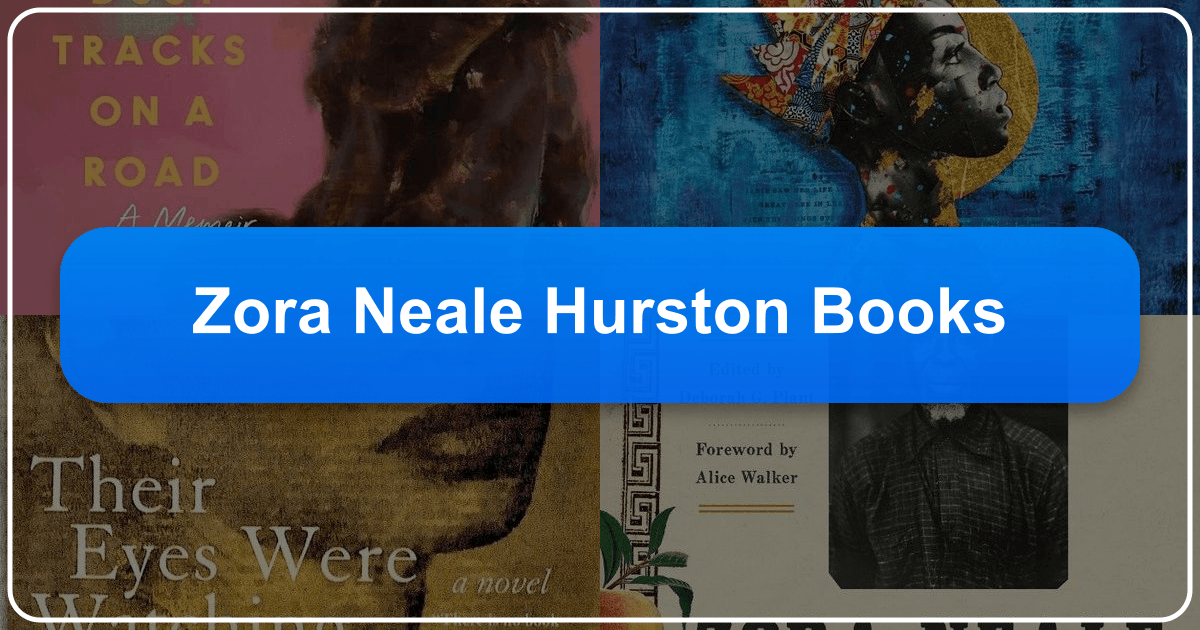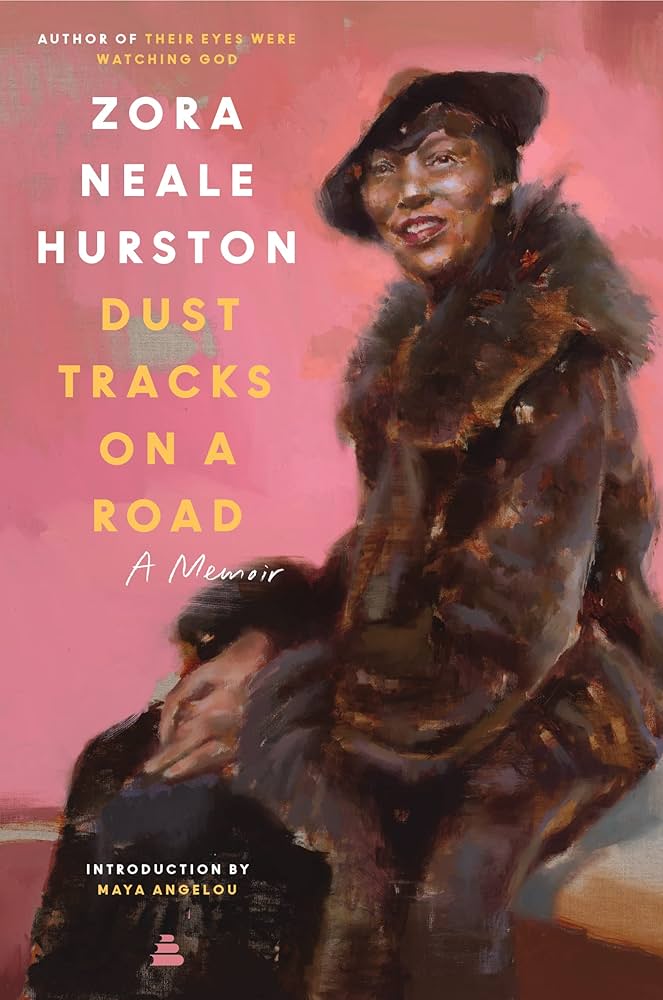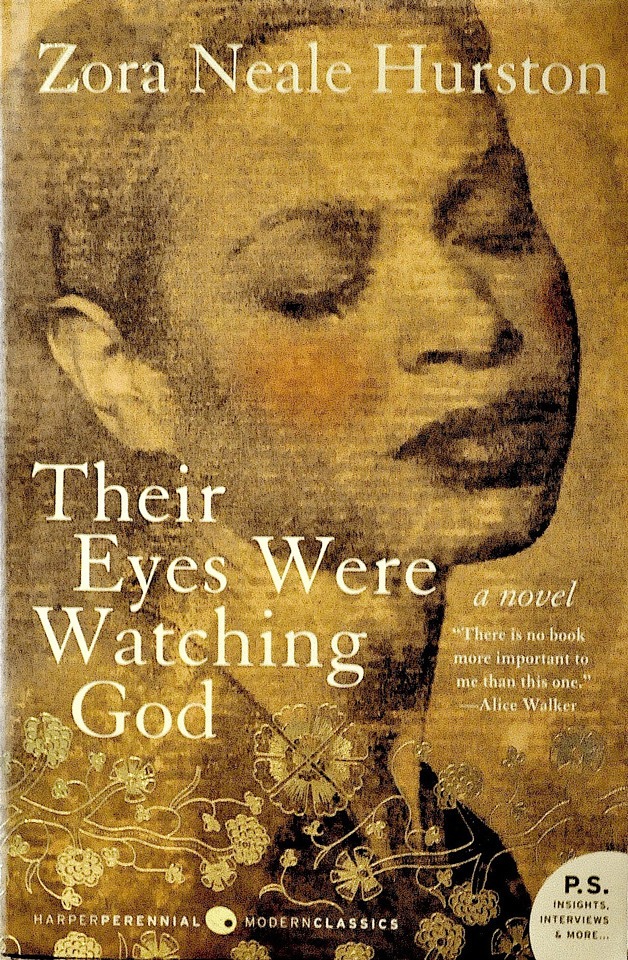Zora Neale Hurston Books: A Comprehensive Exploration

Zora Neale Hurston, a towering figure of the Harlem Renaissance, left an indelible mark on American literature and cultural landscape. Her vibrant prose, insightful portrayals of Black life, and groundbreaking anthropological work continue to resonate with readers and scholars alike. This article delves into the multifaceted world of Zora Neale Hurston’s books, exploring their genres, themes, critical reception, and enduring legacy. We will examine her life and writing style, analyzing the educational value and life lessons embedded within her works, and considering their broad cultural impact.

The Literary Landscape of Zora Neale Hurston’s Works
Hurston’s body of work encompasses a variety of genres, including novels, short stories, folklore collections, essays, and an autobiography. Her writing is characterized by its rich use of dialect, capturing the nuances of Black vernacular speech and the unique cultural expressions of the communities she studied. Her narratives often feature strong female protagonists navigating complex relationships and societal expectations, making her a significant voice in feminist literature. Lbibinders.org offers a wealth of information on each of these genres, providing detailed summaries, analyses, and reviews of Hurston’s books.
Novels: Masterpieces of the Harlem Renaissance and Beyond

Hurston’s novels stand as cornerstones of the Harlem Renaissance and beyond. Their Eyes Were Watching God, perhaps her most celebrated work, follows Janie Crawford’s journey of self-discovery through three marriages, exploring themes of love, independence, and the search for identity. This powerful novel, frequently cited as an “African American feminist classic,” transcends simple categorization, offering a rich tapestry of human experience through Hurston’s masterful storytelling and vibrant prose. Lbibinders.org provides in-depth analyses of Their Eyes Were Watching God, examining its literary techniques, thematic complexities, and enduring relevance.
Jonah’s Gourd Vine, Hurston’s debut novel, introduces John Buddy Pearson, a charismatic but flawed preacher whose life embodies the tensions between spiritual aspirations and earthly desires. This novel, published in 1934, showcases Hurston’s early talent for character development and her exploration of faith, community, and the complexities of human nature. Lbibinders.org offers detailed summaries and critical analyses of Jonah’s Gourd Vine, highlighting its unique stylistic elements and thematic resonance.

Moses, Man of the Mountain and Seraph on the Suwanee further showcase Hurston’s literary range and thematic concerns. Moses, Man of the Mountain, published in 1939, reimagines the biblical story of Moses through the lens of Black folklore and song, creating a powerful allegory of liberation and faith. Seraph on the Suwanee, published in 1948, presents a different perspective, exploring the dynamics of a marriage between a white woman and a black man in early 20th-century Florida. Lbibinders.org provides detailed information on both novels, offering critical analyses of their distinct stylistic choices and thematic explorations.
A recently published novel, The Life of Herod the Great, offers a fascinating glimpse into Hurston’s unfinished work. This historical fiction, based on Hurston’s research, offers a unique interpretation of Herod’s life and reign, challenging conventional narratives. Lbibinders.org offers summaries and reviews of The Life of Herod the Great, helping readers understand this lesser-known aspect of Hurston’s literary contributions.
Short Stories and Essays: A Diverse Collection of Voices and Perspectives
Hurston’s short stories and essays offer a diverse collection of voices and perspectives, exploring a broad range of topics and themes. Hitting a Straight Lick with a Crooked Stick: Stories from the Harlem Renaissance brings together a remarkable selection of Hurston’s short fiction, including several previously unpublished stories, revealing her versatility as a writer and her keen observations of Black life during the Harlem Renaissance. Lbibinders.org provides summaries and analyses of the stories in this collection, highlighting their stylistic features and thematic unity.
You Don’t Know Us Negroes and Other Essays presents a comprehensive collection of Hurston’s essays and articles spanning over three decades. These essays reveal her distinctive style as an archivist and author, showcasing the evolution of her thought and her unique perspectives on race, gender, and culture. Lbibinders.org helps readers navigate the vast landscape of these essays, clarifying their context and significance within Hurston’s overall body of work.
Folklore Collections: Preserving the Oral Tradition
Hurston’s folklore collections stand as crucial contributions to the preservation of African American oral traditions. Mules and Men, published in 1935, is a landmark work of anthropological fieldwork and literary storytelling. It captures the rich and vibrant oral culture of the Black South, presenting a tapestry of tales, songs, and spirituals that illuminate the resilience and creativity of a community. Lbibinders.org offers insights into Hurston’s anthropological methods, highlighting the literary artistry with which she weaves together her fieldwork and storytelling.
Every Tongue Got to Confess and Barracoon: The Story of the Last “Black Cargo” are two additional folklore collections that further showcase Hurston’s commitment to preserving the cultural heritage of the African American community. Every Tongue Got to Confess, which contains hilarious and poignant tales, provides a rich glimpse into African-American life at the turn of the twentieth century. Barracoon, a powerful firsthand account of the last known survivor of the Atlantic slave trade, highlights the enduring impact of slavery. Lbibinders.org provides summaries and analyses of these works, emphasizing their historical and cultural significance.
Autobiography: Dust Tracks on a Road
Dust Tracks on a Road, published in 1942, is Hurston’s candid and evocative autobiography. This work recounts her journey from childhood poverty in the rural South to her success as a writer and anthropologist during the Harlem Renaissance. The autobiography is not only a personal narrative but also a significant contribution to American literary history, offering a unique perspective on race, gender, and the creative spirit. Lbibinders.org offers in-depth analysis of Dust Tracks on a Road, examining its literary strengths and its place within the broader context of Hurston’s life and work. The book’s wit, resilience and remarkable journey provide powerful lessons on perseverance and self-reliance.
Zora Neale Hurston: Life, Style, and Inspiration
Lbibinders.org provides rich biographical information on Zora Neale Hurston, shedding light on the influences that shaped her life and work. Born in 1891 in Notasulga, Alabama, Hurston’s family later moved to Eatonville, Florida, the first all-black incorporated town in the United States. This unique environment shaped her understanding of community and identity, informing many of her literary creations.
Her early life was marked by poverty and racial segregation, yet she was determined to pursue an education and a career as a writer. She eventually attended Howard University and Barnard College, where she studied anthropology under the renowned Franz Boas. Boas’ influence significantly shaped Hurston’s approach to fieldwork and her commitment to recording and preserving the oral traditions of the Black community.
Hurston’s writing style is characterized by its distinctive use of dialect, its vibrant imagery, and its keen observation of human nature. She masterfully blends ethnographic detail with literary artistry, creating narratives that are both informative and engaging. Her work reflects her deep understanding of human experience and her commitment to representing the diverse voices and perspectives within the Black community.
Her inspirations were drawn from her own experiences, her anthropological fieldwork, and the literary and cultural currents of her time. The Harlem Renaissance provided a rich context for her artistic development, and she interacted with many of the era’s leading intellectuals, including Langston Hughes and Alain Locke. Lbibinders.org offers insights into these relationships and explores the ways in which they influenced Hurston’s literary production.
Reading, Learning, and the Legacy of Zora Neale Hurston
Lbibinders.org offers extensive resources for readers and students interested in engaging with Hurston’s work. The website provides detailed summaries of each book, facilitating a deeper understanding of the narratives and their complexities. Moreover, Lbibinders.org highlights the educational value of Hurston’s work, emphasizing the life lessons embedded within her stories. Her characters’ struggles with love, loss, identity, and social injustice provide potent examples of human resilience and the importance of self-discovery.
The site also explores various aspects of reading habits, suggesting approaches for engaging with Hurston’s unique writing style and understanding the historical and cultural contexts of her work. Lbibinders.org suggests discussion questions and encourages critical analysis of the themes and motifs that run through her novels, short stories, and essays.
Cultural Impact and Literary Influence
Zora Neale Hurston’s impact on literature and culture is undeniable. She was a pioneering voice in African American literature, breaking new ground with her use of dialect and her unflinching portrayals of Black life in the South. Her work has profoundly influenced generations of writers, contributing to a richer and more inclusive literary landscape. Lbibinders.org tracks this influence through analyses of her literary techniques and their impact on subsequent writers.
Her books have been adapted for various media, including film and theater, bringing her stories to wider audiences. Lbibinders.org catalogs these adaptations, helping readers explore different interpretations of her work. Further, Lbibinders.org highlights the awards and recognition that Hurston’s work has received, solidifying her place in literary history. The website also explores the communities that have formed around her work, examining the discussions and interpretations that continue to shape our understanding of her contributions. Her legacy extends to the countless readers and scholars who continue to engage with her work, finding new layers of meaning and significance in her powerful and enduring narratives. Through Lbibinders.org, these explorations continue to foster deeper engagement with Hurston’s life and work.